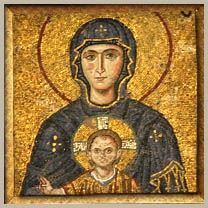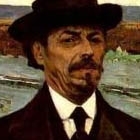This is a page with a collection of vidoes of Constantinople and modern day Istanbul. Some are amazing virtual reality like recreations of old Byzantium.







CHAPTER 13
IN BELOVEGE
WE returned to Tsarskoe Selo from Moscow, and stayed there until we went to Peterhoff.
The Imperial estate in Peterhoff belongs to the reigning Empress. It is settled on her for life, and she must hand it on to the wife of the next Emperor. It belongs at present to the Dowager Empress; at her death it will pass to the Empress Alexandra Feodorovna.
The story of Peterhoff is as follows: When Nicholas I. was a young man he paid a visit to the German Court. A tournament was arranged and the young Grand Duke acquitted himself bravely. Afterwards all who took part in the tournament rode up under the balcony where the ladies of the family were seated. The young princess of Prussia threw him a wreath of roses which he caught on his sword. An attachment speedily sprang up between the couple and they were married. When he became Emperor he bought what is now the private park at Peterhoff, and built a residence in it, which he named The Cottage. In memory of his first meeting the Empress said that everything in the house should bear the device of a wreath of roses on a sword.
The Dowager Empress is a very attractive person. She has the full rich voice, and the excessive tact which belong to the Danish family, as well as their youthful looks. This latter fact should not surprise us, as, according to the old story, they have the stone of youth. A Limerick man once went to stay in Copenhagen, where he found himself very comfortable -- one person vied with another to make him happy. When he was going away he said to his kind entertainers, "Tell me what I can do for you; I will go to the ends of the earth to serve you." They told him that in a certain spot in a field in County Limerick a box of gold was buried. If he would dig up the box he would find a stone ring. This ring he was asked to send to Copenhagen, but for his trouble he could keep the gold.
On arriving in his own country the warmhearted Irishman at once repaired to the field and quickly unearthed the treasure. He started off to Copenhagen, bearing the box of gold with him. He pressed his kind friends to take the box, but they insisted on retaining only the ring of stone, which they put into a safe place. They then addressed him thus: "Unfortunate wretch! you have betrayed and ruined your country. All would have gone well as long as the ring of youth remained in her, but from henceforth all poverty will leave Denmark, and her women will be always young and beautiful, while Ireland will bear a double burden of poverty, her children will be forced to other countries, nothing will thrive in Ireland."
From Peterhoff we went to Belovege, near the borders of Poland, for shooting. There is a great forest as large as the whole of Ireland; in parts it is trackless; people are often lost there, and wander round and round in a circle, cutting notches in trees as they pass them, and dead bodies are frequently found there. A few weeks before we arrived, the dead body of a traveller was found only a few minutes' walk from security.
The late Emperor had a clearing made of almost three and a half square miles, and built a small palace on a slight elevation. There are prettily laid out gardens, and the building itself is picturesque. Inside it is much decorated, and one room would delight a philatelist; it is altogether decorated with stamps -- walls, furniture, everything are covered with old postage stamps. It has the effect of curious looking mosaic. I have been told that many of the stamps are very valuable specimens. The work of sticking them on alone must have been tremendous.
In the forest roam elk, bisons, great red deer, and wild boars. An elk is the gentlest creature that lives, even if wounded he never attempts to turn on his assailant; the bison, however, is ferocious, as is also the wild boar. The elk is a very ugly animal, like a horned donkey. We never went into the forest without a guide, it being too dangerous. Fires frequently occur, so a very strict watch is kept for remains of fires lighted by gipsies and others passing through the forest. Forest fires are put out by cutting down trees and digging a ditch outside the fire, but they sometimes rage for days. There are many venomous snakes in the forest, therefore one must be cautious. I realised more in Belovege than anywhere else how terrible nature can be in her solitary places. The forest frightened me with its unknown possibilities of danger. I believe wild men are more to be feared there, than wild beasts. These are men who have been deprived of their passports and sent into the country.
Just before we went to Belovege there had been an outbreak of smallpox in the village and surrounding country. It was treated in what is called the Swedish method. Every patient was vaccinated seven times on successive days. The treatment was most successful; there had been two hundred and fifty cases and four of them were babies under a year old. Not a single patient died, nor were any of them disfigured by this terrible disease.
From Belovege we went to Spala in Poland for shooting. Here there is little big game, and the forest is much smaller than that of Belovege, only being about as large as Yorkshire. It is also more open; a pretty river in which boating may be had runs through the estate.
Various surprises had been arranged for the children. In a little orchard a tea-house had been built and about a dozen tame deer turned in, besides tame pheasants, hares, etc. These creatures would all come and eat from our hands, and the deer would follow me about everywhere, lay their pretty heads on my arm and, looking beseechingly in my face, seem to beg for notice. The Grand Duchess Tatiana named them "the pretty creatures" and by this name they were henceforth known. Outside the palings enclosing this fairyland flowed a river in which swam all manner of water-fowl which would come to be fed; so it was a regular paradise for children.
A further surprise awaited them in the shape of a little goat-carriage drawn by a pair of goats, each led by a boy in Polish costume, a long frock coat of white homespun decorated with black braid, and a high crowned black felt hat trimmed gaily with bands of black velvet ribbon, coloured paper flowers and a rosette of different coloured ribbons. The trimming was pinned on the hat!



